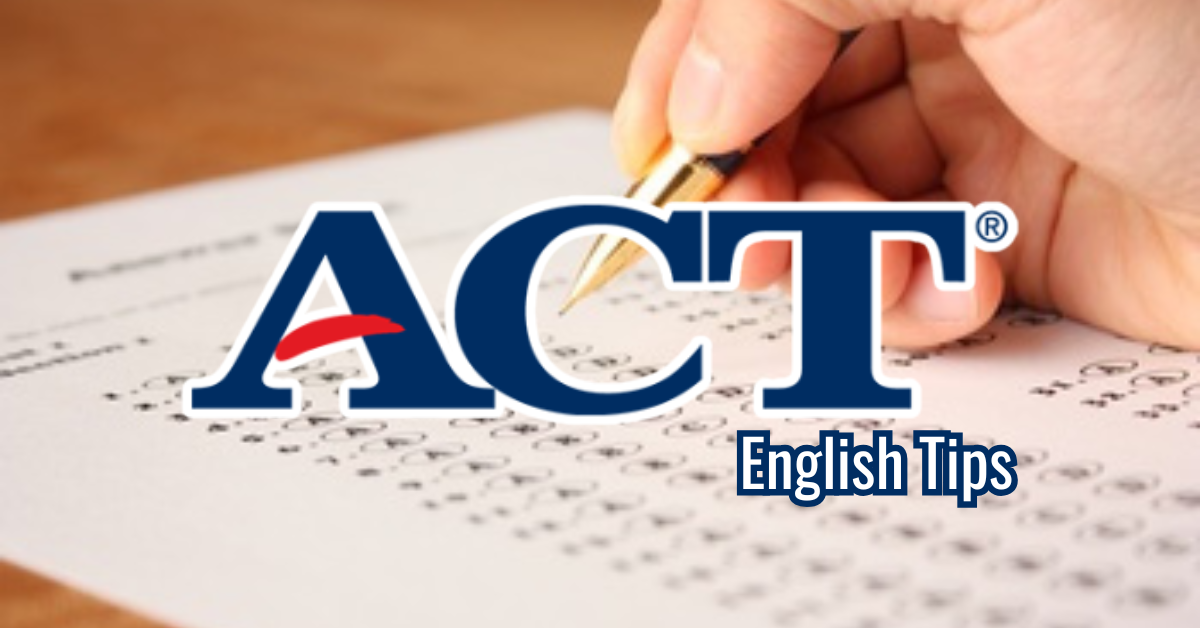Standardized tests aren’t exactly anyone’s idea of fun. But if you have to take the ACT anytime soon, you’re probably wondering how to study for the English section without turning into a grammar-obsessed robot. We can promise: you really don’t have to!
The good news is that the ACT English section is super learnable. Once you understand the types of questions and know what to look for, you’ll be able to spot comma splices and awkward phrasing in your sleep.
We’ll walk you through 8 no-nonsense ACT English tips to help you feel more confident on test day (and maybe even finish with a few minutes to spare).
8 ACT English Tips
1. Know What’s Actually on the ACT English Section
Before we get to the tips, it helps to know what you’re dealing with.
The English section contains:
- 75 questions
- 5 short passages
- Just 45 minutes to get through all of it
That’s less than a minute per question…so yeah, time management is key.
But don’t stress if one question takes a little longer. Some come with more text or are just a bit trickier, so it makes sense to slow down slightly. Other questions are shorter and quicker, so it usually all balances out.
However, if you get really stuck on one question, skip it and come back later. Don’t spend 10 whole minutes on one hard question and risk not finishing the rest. Your time is precious.
The questions fall into two categories:
- Usage and Mechanics (think: grammar, punctuation, sentence structure)
- Rhetorical Skills (organization, tone, clarity, and word choice)
Knowing what the ACT wants from you is half the battle.

2. Brush Up on the Most Common Grammar Rules
Don’t panic! You’re not expected to be an English professor. But you should definitely know:
- Subject-verb agreement
- Verb tense consistency
- Pronoun usage
- Punctuation (commas, apostrophes, colons, semicolons…your new besties)
These rules show up a lot on the ACT English test. They’re repetitive so if you master them early, you’ll start recognizing patterns and flying through questions.
3. Sentence Structure is Everything
The ACT loves to test your ability to tell a complete sentence from a hot mess.
Here’s what to watch for:
- Fragments (sentences that are missing something important)
- Run-ons (sentences that try to do too much without the right punctuation)
- Comma splices (two full thoughts joined incorrectly by just a comma)
The trick: Read it aloud in your head. If it sounds wrong, it probably is.
4. Clarity > Fancy Words
The ACT isn’t impressed by big, complicated words. In fact, the simplest answer is usually the right one.
If a sentence feels:
- Too wordy
- Redundant
- Trying too hard to sound smart…
…it’s probably wrong.
Stick with clear, direct answers. No fluff. No filler.
Let’s look at an example:
Because of the fact that the storm had occurred unexpectedly, we were unable to proceed with the event as planned. (Wrong answer)
Because the storm was unexpected, we had to cancel the event. (Correct answer)
See how the second one gets to the point without all the extra fluff?
Of course, not every long sentence is wrong. Sometimes the longer sentence might be the correct choice (when it adds important info or better structure). But as a general rule, choose clarity over complexity.

5. Read the Whole Paragraph (Not Just the Sentence)
Sometimes, the correct answer depends on context. If you focus only on the underlined sentence, you might miss something important.
Ask yourself:
- Does this sentence logically connect with the ones around it?
- Is there a better transition word based on the flow of ideas?
Reading just a little extra can save you from a wrong answer.
6. Practice With Real ACT English Questions
Practice really does make progress. Use ACT English practice tests to train your brain to recognize patterns. Nothing beats working with real test questions. They help you get used to the style, format, and little grammar traps the ACT loves to throw at you.
You can easily find official ACT practice tests online (just Google “official ACT practice test PDF” and you’ll find a few straight from ACT.org).
Don’t just casually scroll through questions.
Instead:
- Set a timer and simulate real test conditions
- Check your accuracy after each section
- Review your mistakes (especially the ones that made you go “Wait… seriously?”)
- Read the explanations to learn from them
Need materials? Check out some solid ACT test prep books to build your study stack.
7. Eliminate the Obviously Wrong Answers
Multiple choice = built-in clues.
If an option:
- Changes the meaning of the sentence
- Is grammatically incorrect
- Just feels awkward…
…go ahead and cross it off. Even if you’re unsure, narrowing it down increases your chances of guessing right. Trust your gut (especially after some practice).

8. Learn from Broader ACT Prep Tips
The English section is just one part of the whole test. If you’re serious about leveling up your score, don’t stop here.
Make sure to check out these smart ACT tips that cover prep strategy, time management, and test-day game plans. They will not only help you with the other sections of the ACT, they will also help you study better for the English section specifically. Because, after all, you’ll realize that the general tips are not that different from the specific ACT English section tips you’re reading about here or elsewhere.
Bonus: If you’re curious about how acceptance rates work and want to set realistic college goals, this Q&A about acceptance rates is a helpful read too.
How Should Students Prepare for the ACT English Test?
Studying for the ACT English section doesn’t have to be overwhelming. When you’re using the right study strategy (and add a little consistency), you’ll start seeing real progress.
Remember:
- Know the grammar rules that matter.
- Practice smart.
- Keep it simple.
And look at it this way: by reading this post, you’ve already taken the first step towards success. Now don’t forget to prepare for the other sections of the ACT so that your math score doesn’t drag down your (perfect) English score.
Good luck!
Want to boost your overall study game? Check out these helpful reads: Study Habits: The Best and the Worst for All Types of Learners, 4 Unconventional Study Tips, and What Not to Do When Cramming for Exams.


